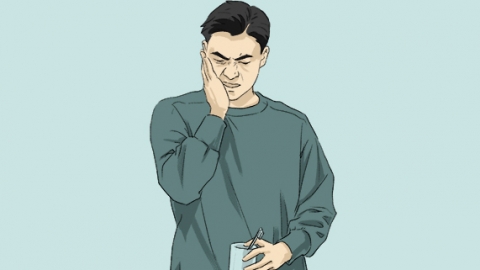What should I do if my teeth are sensitive after grinding?
Generally, tooth sensitivity and soreness may result from long-term biting of hard objects causing tooth wear, frequent teeth grinding at night, dentin hypersensitivity, severe enamel wear, or wedge-shaped defects. It is recommended to seek medical advice promptly, identify the underlying cause, and improve symptoms under a doctor's guidance through general treatments, medications, or surgical interventions. Detailed analysis is as follows:

1. Tooth wear from prolonged biting of hard objects: Frequently chewing hard items such as nutshells, bones, or hard candies can gradually wear down the tooth's enamel layer, exposing the underlying dentin. This leads to tooth sensitivity when stimulated by cold, heat, sourness, or sweetness. Immediately stop biting hard objects and switch to soft, easy-to-chew foods such as porridge, noodles, and steamed eggs.
2. Frequent nighttime teeth grinding (bruxism): Unconscious grinding of teeth during sleep causes prolonged friction between teeth, damaging the enamel and exposing the dentin, which results in tooth sensitivity. This may be accompanied by visible tooth wear or gum discomfort. Consult a dentist to get a custom-fitted night guard to protect your teeth and reduce direct friction during grinding.
3. Dentin hypersensitivity: Tooth wear or gum recession exposes the dentin, opening up microscopic tubules that transmit external stimuli to the nerve, causing sensitivity—especially in response to cold, heat, acidity, or sweetness. Patients should use desensitizing agents such as 75% sodium fluoride glycerin paste, 10% strontium chloride toothpaste, or 2% potassium nitrate solution as directed by a healthcare provider to relieve symptoms.
4. Severe enamel wear: Prolonged wear can lead to near-complete loss of enamel, with large areas of dentin exposed, resulting in frequent and intense tooth sensitivity, possibly accompanied by pain. A dentist may perform dentin sealing therapy, using specialized sealants to block the dentinal tubules and shield them from external stimuli.
5. Wedge-shaped defects: Long-term horizontal brushing or uneven stress on teeth can cause wedge-shaped notches at the necks of teeth, exposing dentin and leading to sensitivity. As these defects deepen, they may lead to pulp infection. A dentist should restore the damaged area using filling materials such as glass ionomer cement, composite resin, or zinc polycarboxylate cement to repair the tooth structure.
In daily life, maintain proper brushing techniques using the Bass method and choose fluoride-containing anti-sensitivity toothpaste. Reduce intake of stimulating foods such as those that are extremely hot, cold, sour, or sweet to avoid worsening tooth sensitivity. Schedule regular dental check-ups to detect early signs of tooth wear or damage, and practice scientific oral care to maintain dental health and alleviate tooth sensitivity.





